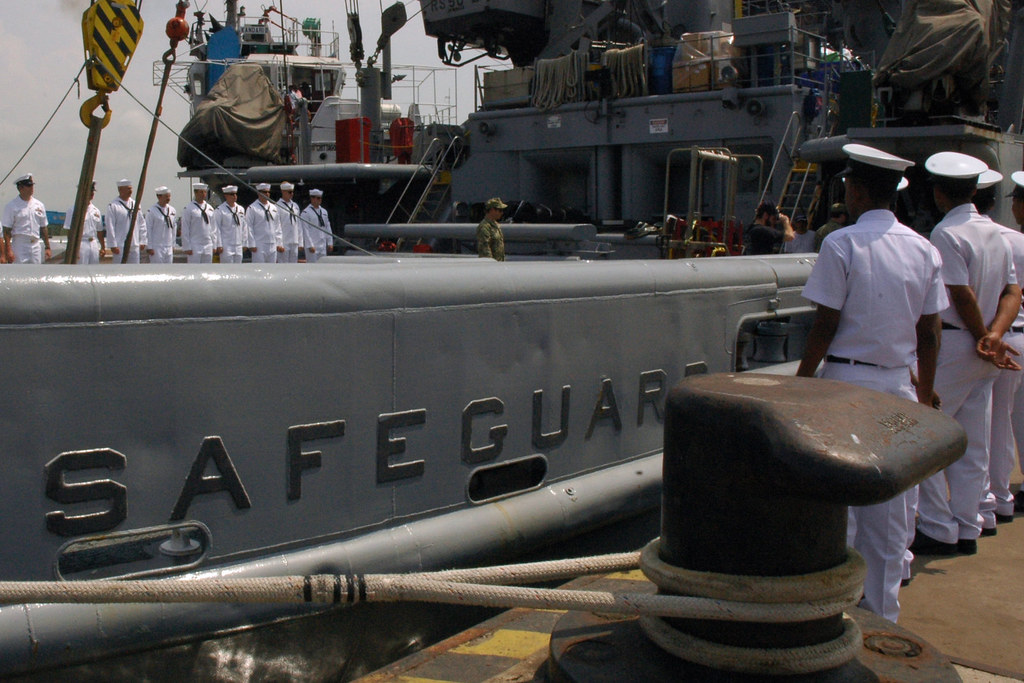From Task Force 73 Public Affairs
In this file photo, USNS Safeguard arrives in Chittagong in 2014 for CARAT. (U.S. Navy/MC1 Cody Histson) >>
CHITTAGONG, Bangladesh - The 5th annual exercise Cooperation Afloat Readiness and Training (CARAT) Bangladesh will commence with an opening ceremony at Naval Base Issa Khan, Sept. 30.
Continuing through Oct. 4, CARAT Bangladesh 2015 will feature five days of shore-based and at-sea training events designed to address shared maritime security priorities, develop relationships, and enhance cooperation between the U.S. and Bangladesh navies.
"Our partnership with the Bangladesh Navy continues to mature and flourish through our routine engagement and strong relationships we’ve developed with our partners,” said Rear Adm. Charlie Williams, Commander, Task Force (CTF) 73. "These relationships enable CARAT to remain a credible venue to sharpen skills, share knowledge, and conduct maritime security cooperation in this important region."
In its 21st year, CARAT is a bilateral exercise series between the U.S. Navy, U.S. Marine Corps and the armed forces of nine partner nations in South and Southeast Asia, including Bangladesh, Brunei, Cambodia, Indonesia, Malaysia, the Philippines, Singapore, Thailand and Timor-Leste.
In 2011, the inaugural CARAT Bangladesh became the first dedicated U.S. and Bangladesh naval exercise in more than a decade. Though a relatively new participant, Bangladesh stands out as the only South Asian nation in the CARAT series and the exercise continues to make steady progress each year with increasing complexity and interoperability.
“Each year we become more familiar with the Bangladesh Armed Forces' operations, equipment and personnel," said Capt. H. B. Le, Commodore, Destroyer Squadron (DESRON) 7. "It's important we continue to work together, share knowledge and learn from each other, so that when our countries call on us to operate jointly, we can do so with efficiency and effectiveness."
CARAT is an adaptable, flexible exercise; its scenarios are tailored with inputs from the United States and partner nations to meet shared maritime security priorities, such as counter-piracy, counter-smuggling, maritime interception operations and port security. The exercise series is also a venue to share the latest best practices in search and rescue, military law and medicine, and humanitarian assistance/disaster response (HA/DR).
CARAT 2015 marks the first time that a littoral combat ship has participated in the exercise with the Bangladesh Navy, enhancing the complexity and interoperability of the exercise. In the Bay of Bengal, the littoral combat ship USS Fort Worth (LCS 3) and the diving and salvage vessel USNS Safeguard (T-ARS 50) with an embarked mobile diving and salvage unit, will operate with Bangladesh Navy ships and aircraft.
A U.S. P-3C Orion maritime patrol aircraft will also participate in CARAT Bangladesh alongside the Bangladesh Navy’s Dornier 228 NG maritime patrol aircraft, enhancing shared maritime domain awareness.
Additionally, U.S. Navy divers and Explosive Ordnance Disposal (EOD) technicians will train with the Bangladesh Navy’s elite Special Warfare Diving and Salvage (SWADS) unit in Chittagong and the surrounding area. Focus areas will include close quarter battle, small boat maintenance, demolition techniques, and diving and salvage operations.
Legal and medical professionals from both navies will exchange best practices during military law and medicine symposia. Receptions and sporting events with participating sailors from both navies will broaden opportunities to develop personal relationships among the forces.
More than 300 U.S. Sailors will participate in CARAT Bangladesh, including personnel aboard Fort Worth and Safeguard, staff from CTF 73 and DESRON 7, Explosive Ordnance Disposal Mobile Unit (EODMU) 5, and Navy Environmental and Preventative Medicine Unit (NEPMU) 6.
Following CARAT Bangladesh, the final phases of CARAT 2015 will occur in November in both Brunei and Cambodia.
CTF 73 and DESRON 7 staff conduct advanced planning, organize resources and directly support the execution of maritime exercises such as the bilateral CARAT series, the Naval Engagement Activity (NEA) with Vietnam, and the multi-lateral Southeast Asia Cooperation and Training (SEACAT) with Brunei, Indonesia, Malaysia, the Philippines, Singapore, and Thailand.

